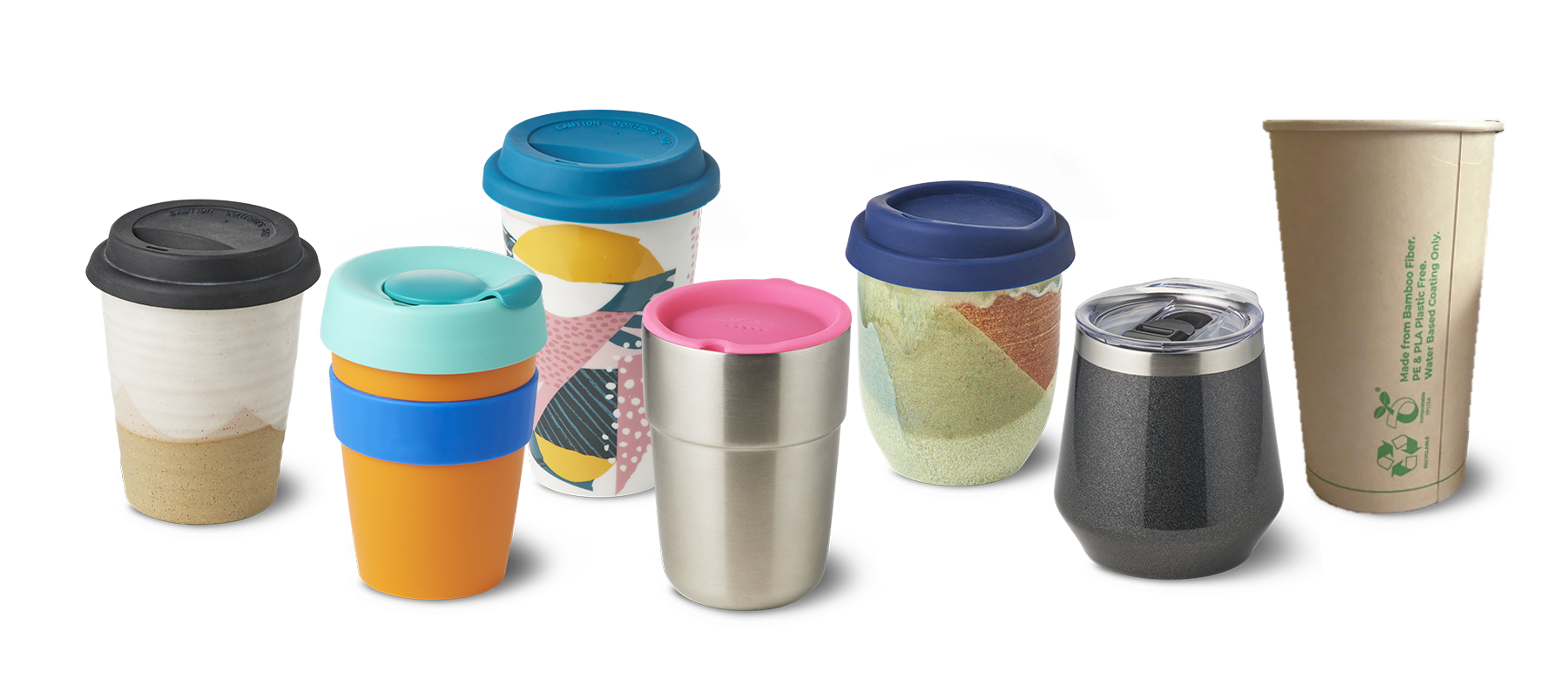In early 2022, South Australians were asked to provide feedback on Turning the Tide on Single-use Plastic 2021. Based on this feedback, the Deputy Premier Hon Susan Close MP announced South Australia’s staged next steps for banning single-use and other plastic products from 2023 to 2025.
On 1 September 2023 plastic pizza savers, plastic-stemmed cotton buds, single-use plastic bowls without lids for food and beverages and single-use plastic plates for food were banned.
Further bans on single-use materials are proposed to commence on 1 September 2024, and 1 September 2025.
The following guide provides an overview of materials proposed to be banned on these dates, as drafted in the draft Single-Use and Other Plastic Products (Waste Avoidance) (Prohibited Plastic Products) Amendment Regulations 2024.
At a glance
From 1 September 2024 the following products will be banned:
- Thick plastic/boutique plastic shopping bags and plastic-laminated paper shopping bags
- Plastic barrier bags for perishable goods
- Plastic bread tags
- Single-use plastic hot and cold beverage cups and single-use plastic lids
- Single-use plastic food containers, including bowls with lids
- Expanded polystyrene (EPS) trays
- Other EPS food and beverage containers
- Plastic confetti
- Plastic balloon sticks and ties
From 1 September 2025 the following products will be banned:
- Plastic produce stickers
- Plastic soy sauce fish
- Attached straws and cutlery
- Pre-packaged EPS containers (such as noodles)
Single-use plastic food and beverage containers
Single-use plastic cups for hot beverages and their attachments (lids and beverage plugs)
What will be banned?
- Single-use hot beverage cups of any material (paper, cardboard, bamboo) lined with a waterproofing polymer (including products coated aqueously) that are not AS certified industrial or home compostable (AS 4736:2006 or AS 5810:2010)
- Single-use plastic lids for hot beverage cups that are not AS certified industrial or home compostable (AS 4736:2006 or AS 5810:2010)
- Bulk packs of single-use plastic hot beverage cups
- Bulk packs of single-use plastic lids for hot beverage cups
- Single-use plastic beverage plugs or stoppers
Note that AS certified industrial or home compostable (AS 4736:2006 or AS 5810:2010) single-use plastic plugs or stoppers will not be permitted.
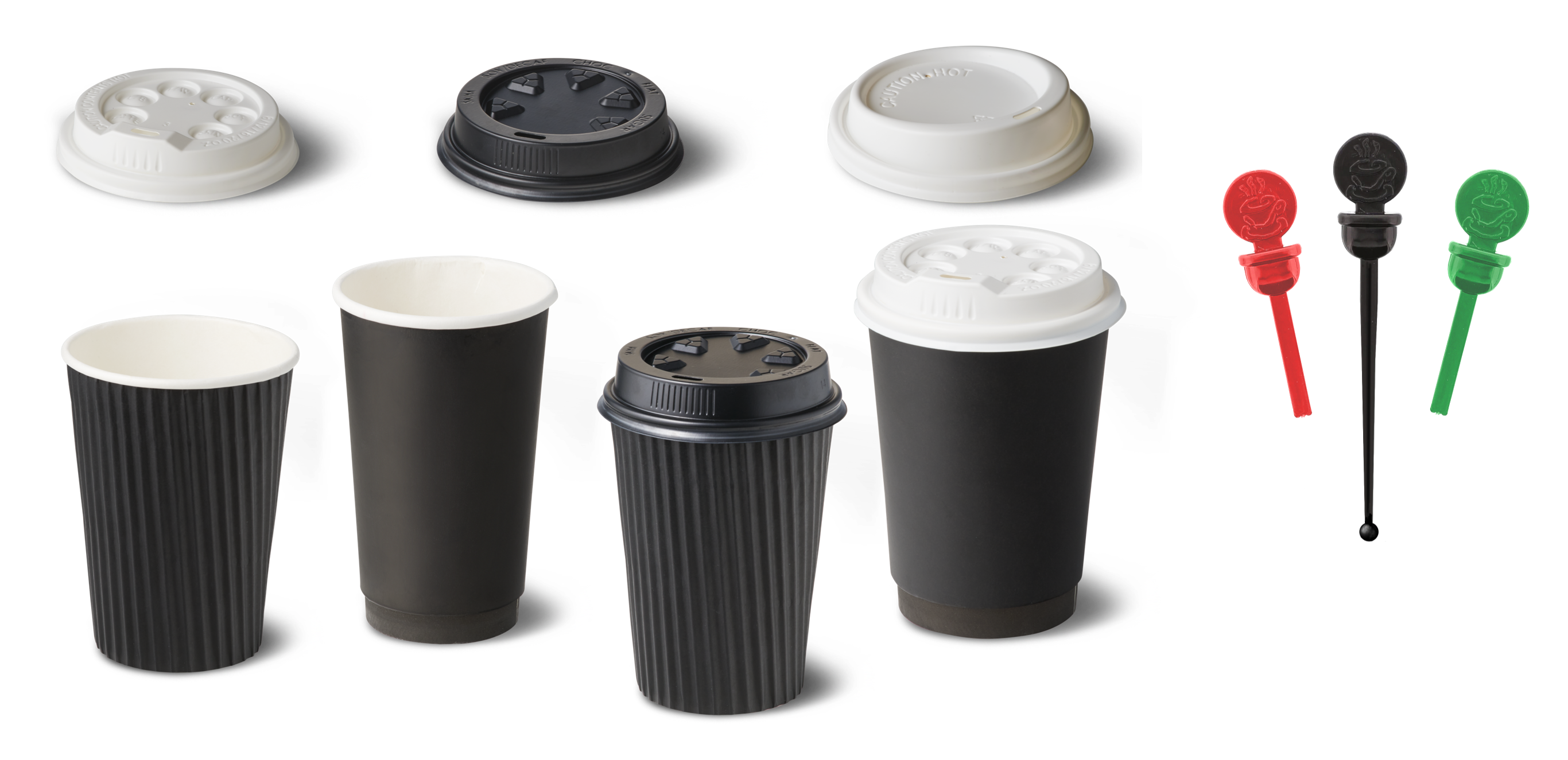
What won’t be banned?
- Reusable, durable plastic hot beverage cups (with or without lids), such as picnic sets, camping sets and combination reusable durable plastic hot beverage cups with lids
- Reusable cups for hot beverages (with or without lids) made from materials other than single-use plastic such as glass, ceramic, aluminium or stainless steel, melamine, wheat straw, and bamboo
- Single-use hot beverage cups of any material (paper, cardboard, bamboo) lined with a water proofing polymer (including products coated aqueously) that are AS certified industrial or home compostable (AS 4736:2006 or AS 5810:2010)
- Single-use plastic lids for hot beverage cups that are AS certified industrial or home compostable (AS 4736:2006 or AS 5810:2010)
- Single-use beverage plugs or stoppers made from wood or cardboard
Businesses are encouraged to investigate options for transitioning to reusable hot beverage containers.
For more information, see the Guide to the ban on single-use plastic food and beverage containers (including cups).
Single-use plastic cold beverage cups and their lids
What will be banned?
- Single-use clear and coloured plastic cups of any shape for cold beverages made from polyethylene terephthalate (PET), polypropylene (PP) polyethylene (PE) or other fossil fuel-derived plastic.
This includes single-use plastic wine glasses, single-use plastic shot glasses and single-use plastic tumblers - Single-use cold beverage cups of any material (paper, cardboard, bamboo) lined with a water proofing polymer (including products aqueously coated) that are not AS certified industrial or home compostable (AS 4736:2006 or AS 5810:2010)
- Single-use plastic lids and plastic films for cold beverage cups, such as plastic dome lids, plastic flat lids and plastic film lids (such as those used to seal bubble tea cups)
- Single-use plastic beverage plugs or stoppers
- Bulk packs of single-use plastic cups
- Bulk packs of single-use plastic lids
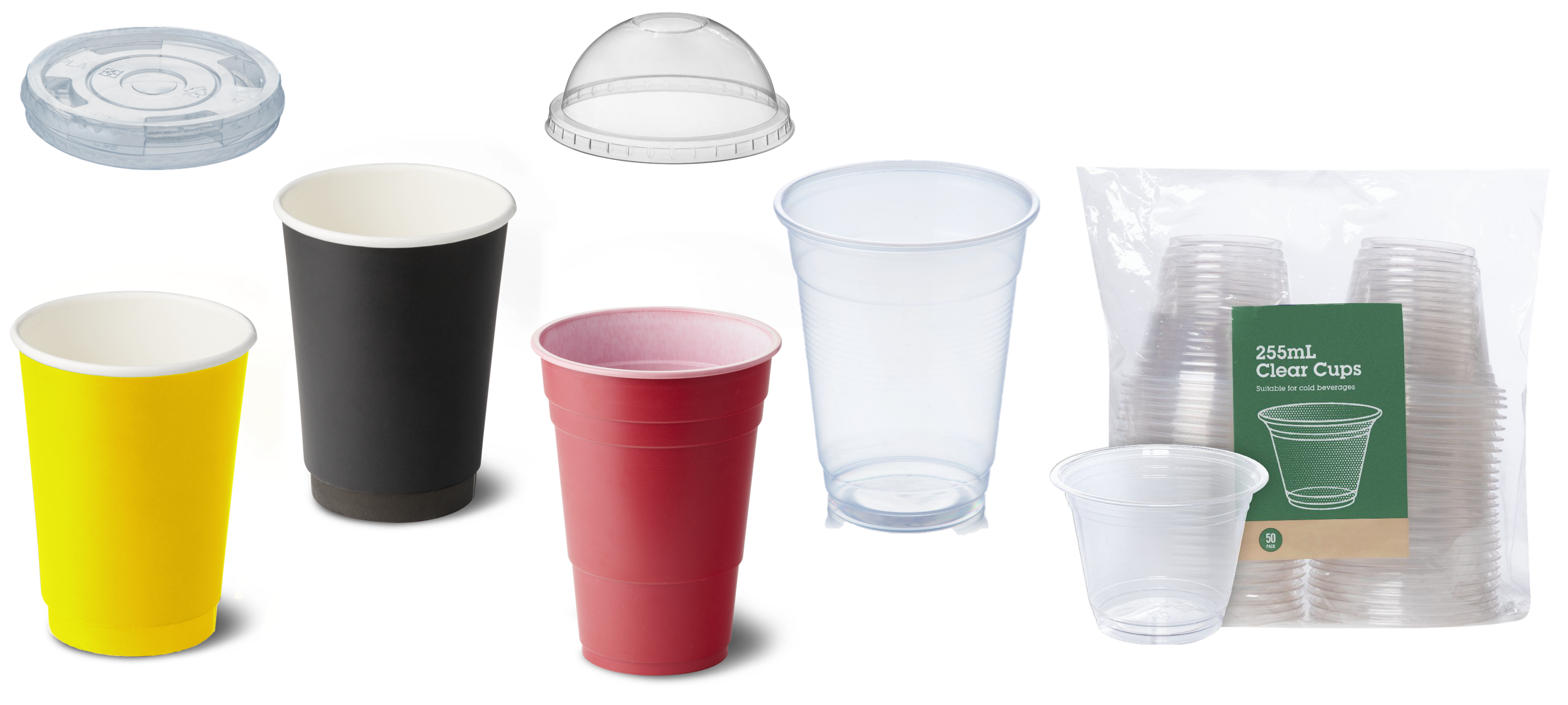
What won’t be banned?
- Reusable, durable, clear and coloured plastic cups for cold beverages, such as picnic sets, camping sets and combination reusable plastic cups with lids
- Reusable cups for cold beverages made from materials other than single-use plastic such as glass, ceramic, aluminium or stainless steel, melamine, wheat straw, and bamboo
- Single-use clear plastic cups and lids that are AS certified industrial or home compostable (AS 4736:2006 or AS 5810:2010) and labelled with details of certification
- Single-use paper cups and lids for cold beverages lined with a polymer (including products aqueously coated) that are AS certified industrial or home compostable (AS 4736:2006 or AS 5810:2010) and labelled with details of certification
- Single-use plastic cups used to dispense medication
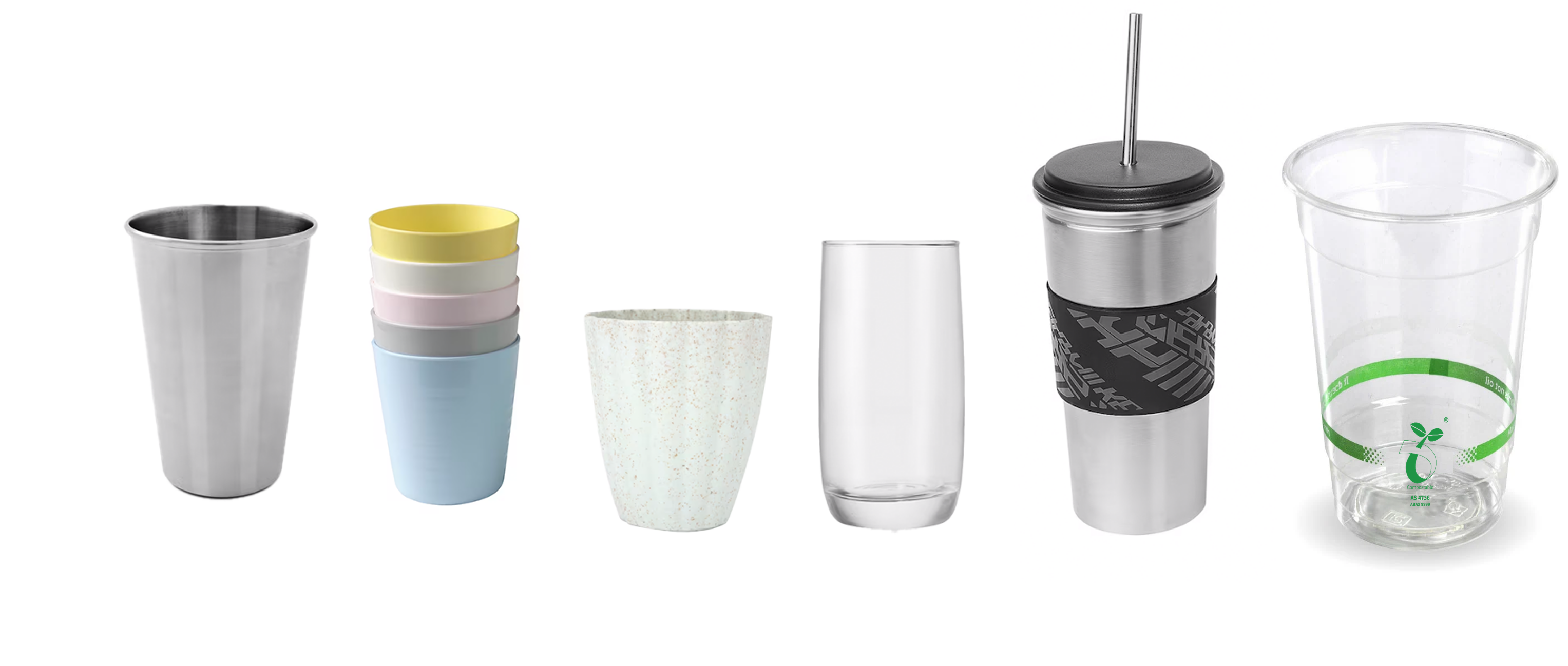
For more information, see the Guide to the ban on single-use plastic food and beverage containers (including cups).
Single-use plastic takeaway food containers
What will be banned?
- Plastic sandwich packaging unless AS certified compostable
- Plastic bowls and serving cups with or without lids (unless all elements are AS certified compostable)
- Plastic food trays with or without lids (unless all elements are AS certified compostable)
- Plastic clamshells (unless AS certified compostable)
- Plastic takeaway food containers with or without lids (unless all elements are AS certified compostable)
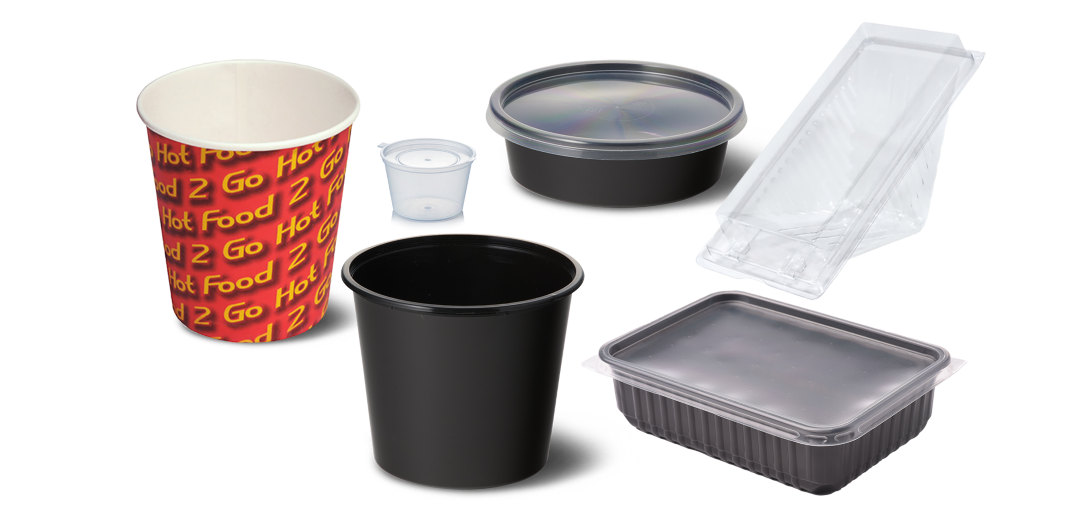
What won’t be banned?
- Plastic containers used for food preparation only, within the premises
- Plastic containers used within a food business or any other business that do not contain food or beverages
- Pre-packaged products that are ordinarily not prepared or made, purchased and eaten on the same day
- Food or drink items which have been pre‑packaged offsite (such as a frozen meal in a tray)
- Plastic containers for foodstuffs which are typically used as an ingredient or component of another dish (such as olives, cheese, salami, dip)
- Plastic containers for food that needs further preparation, cooling or heating before being consumed (such as chilled meals, pre-cut vegetables)
- Plastic containers for food which is not typically consumed whole or in one sitting (such as a multi‑serve tub of yoghurt, multi‑pack of biscuits or bread rolls, bulk pack of fruit pieces, large cake
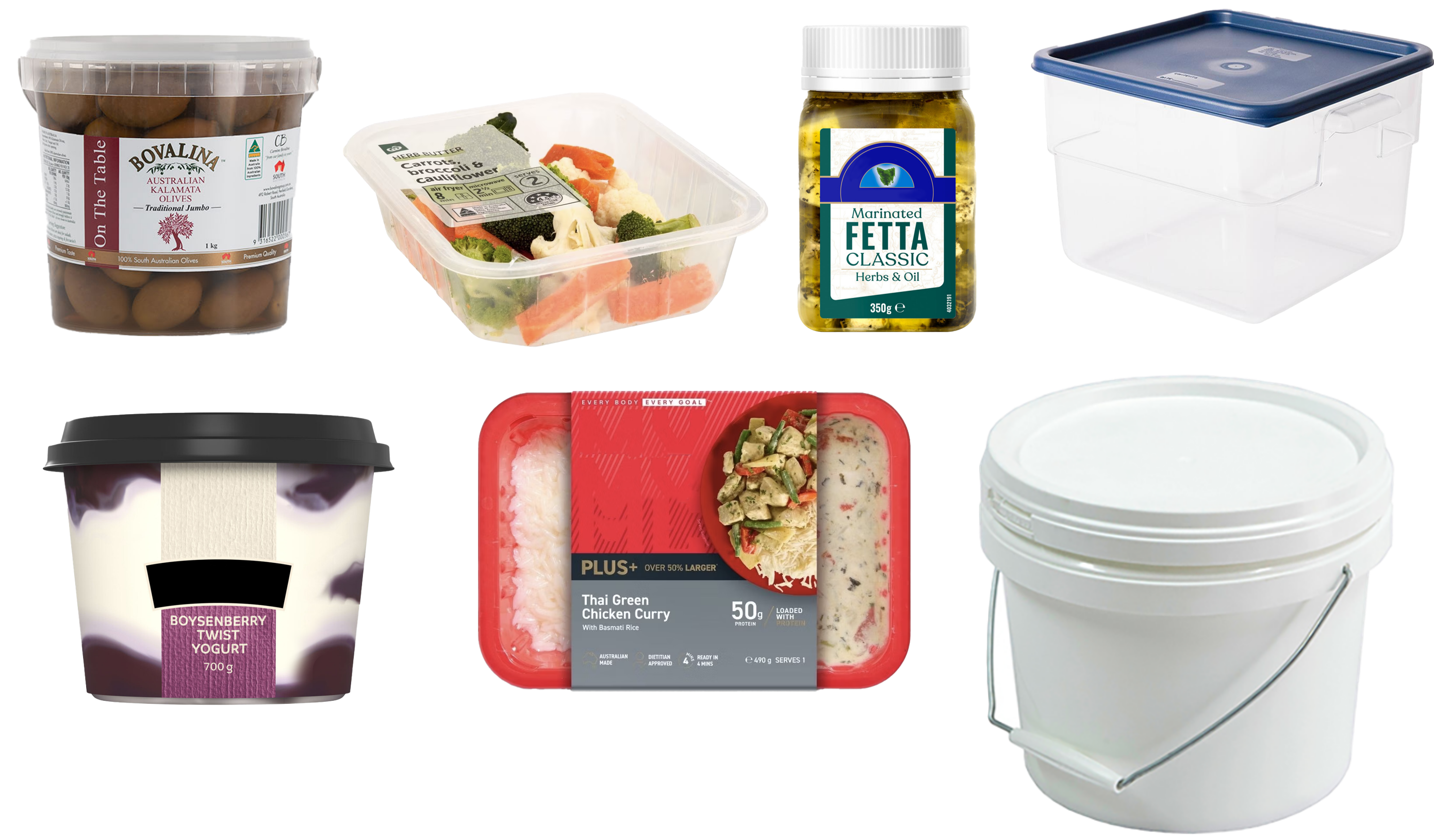
For more information, see the Guide to the ban on single-use plastic food and beverage containers (including cups).
Other expanded polystyrene (EPS) consumer food and beverage trays and containers
What will be banned?
EPS cups, bowls, plates and clamshell containers have already been prohibited from sale, supply and distribution in South Australia since 1 March 2022.
Other EPS consumer food and beverage containers in the market will now be banned from 1 September 2024, including:
- EPS gelato containers
- EPS cake boxes
- EPS trays used for meat, fruit and other food items.
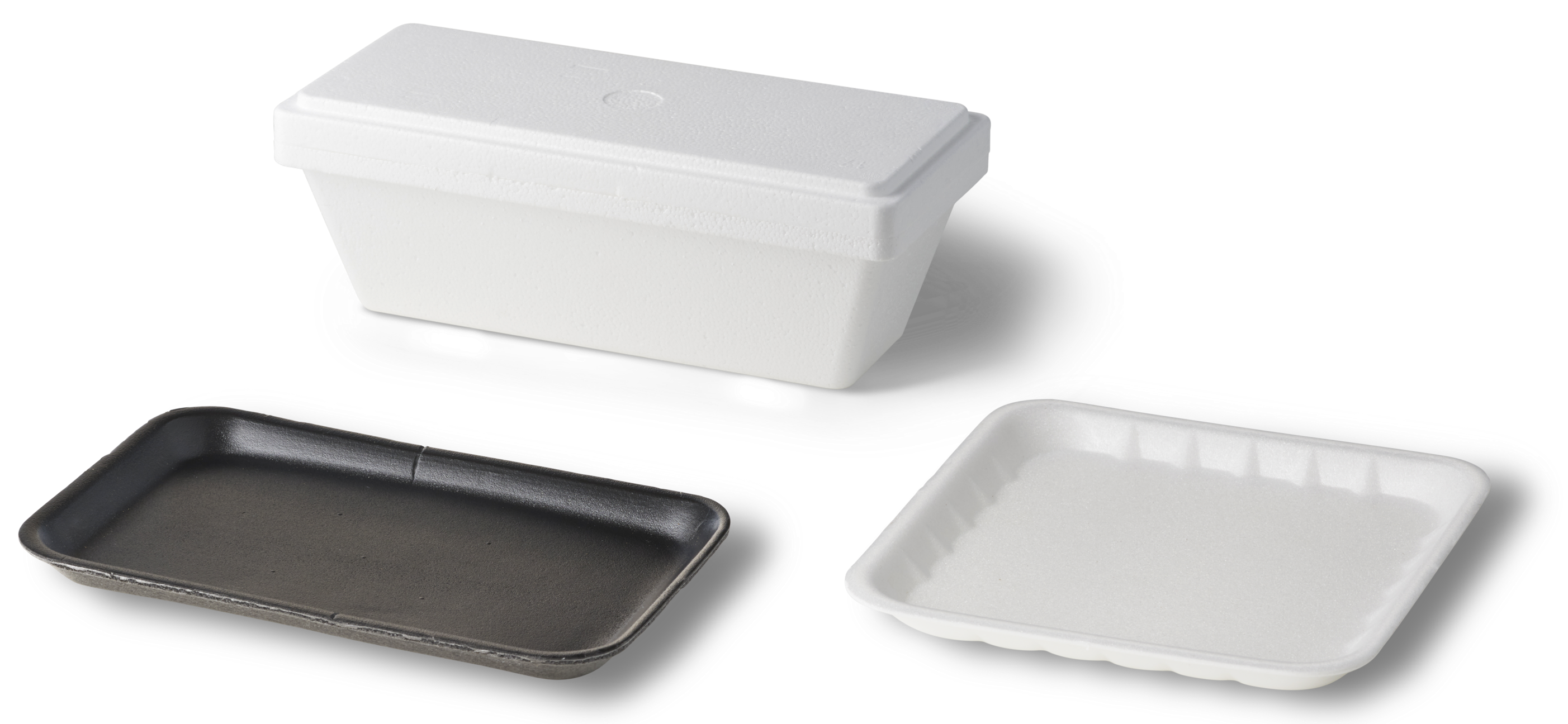
What won’t be banned?
- EPS boxes for home delivery of fresh food and pre‑prepared meals, where there is an opportunity for collection and reuse
- EPS containers that are part of a pre‑packaged product (such as pre-packaged instant noodles). Pre-packaged EPS containers will be banned from 1 September 2025 (see the Guide to the 2025 ban on single-use plastics)
- All business‑to‑business EPS packaging such as delivery of fresh vegetables from field to market, or delivery of meat or seafood from processor/market to retail premises
- EPS boxes used for specialist packaging for medical applications such as organ transport or pharmaceuticals.
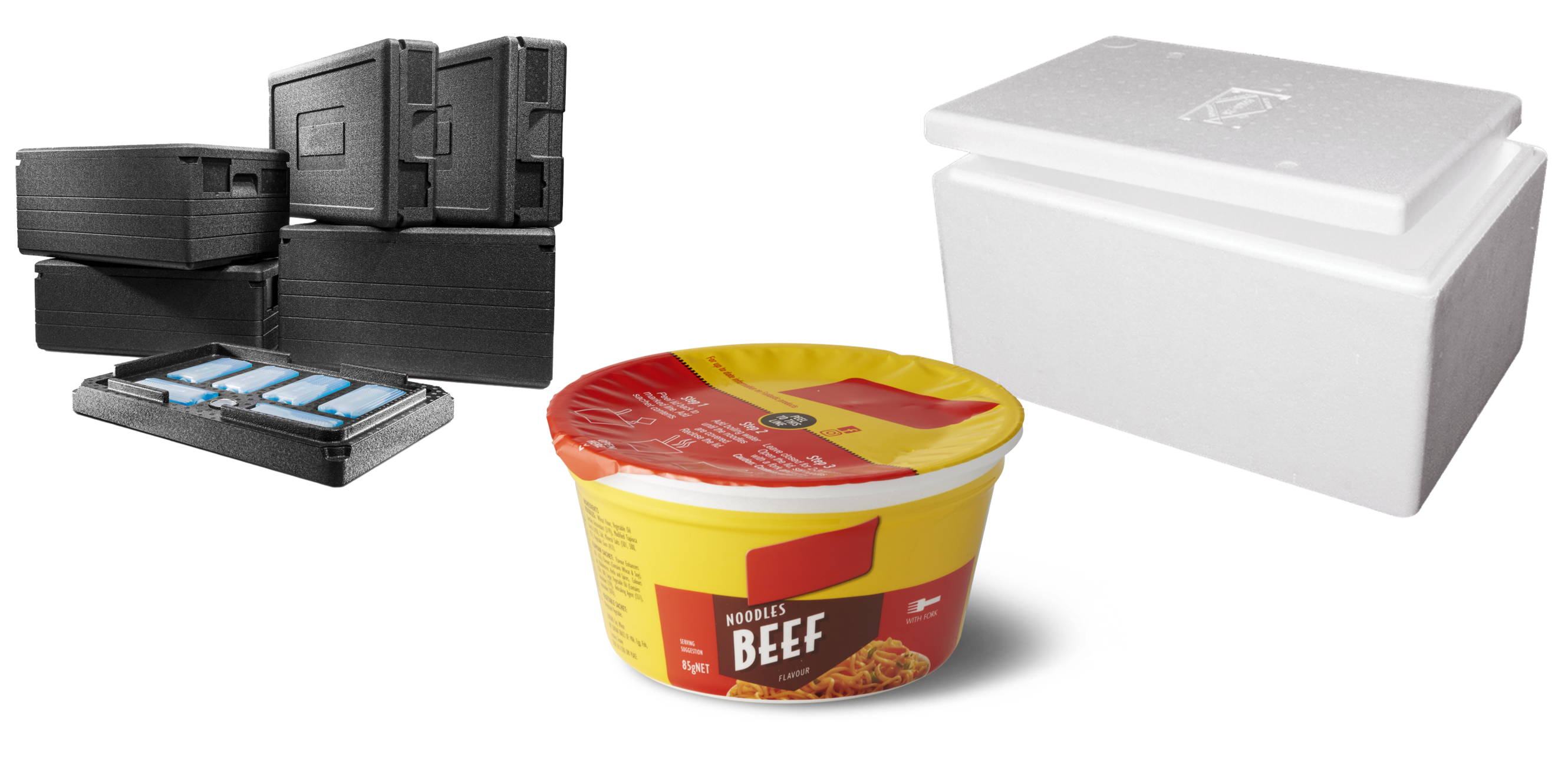
For more information, see the Guide to the ban on single-use plastic food and beverage containers (including cups).
Plastic shopping bags, plastic barrier bags and plastic bread tags
Plastic barrier bags
What will be banned?
A plastic bag without handles (known as either a ‘produce bag’ or ‘barrier bag’) which is used to contain and protect unpackaged fresh fruit or vegetables, nuts, confectionery, dairy products, meat, poultry or fish.
It does not include plastic sleeves used to package or protect herbs or flowers. However, any barrier bag that is used to provide additional protection from leakage from packaging, such as for pre-packed meat, poultry, fish, herbs or flowers, must be AS certified compostable.
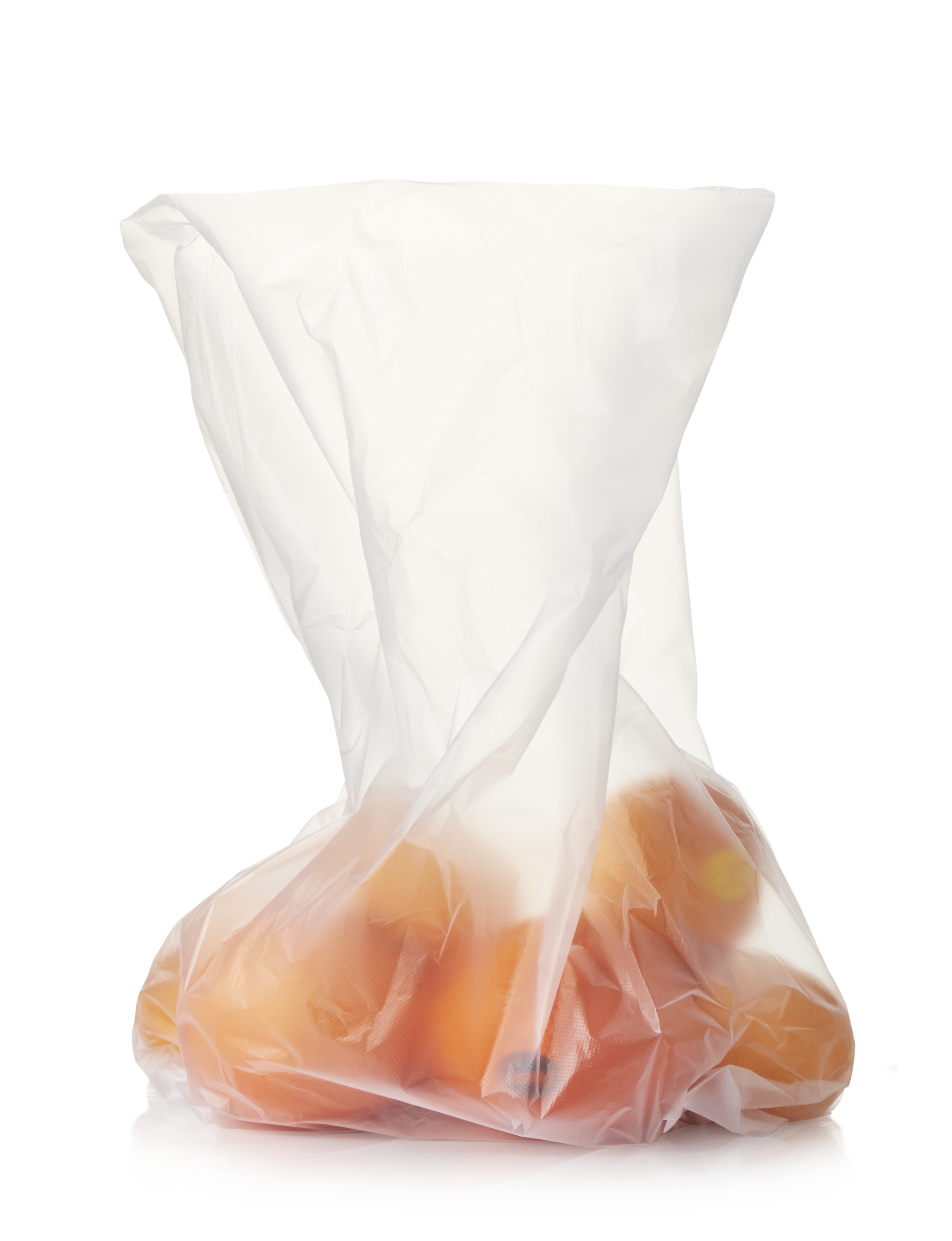
What won’t be banned?
- AS certified compostable bioplastic barrier bags clearly labelled with certification details
- Reusable bags including nylon mesh and cotton bags
- Paper bags
- Plastic bags used for non-food and non-perishable items
- Plastic zip-lock bags
- Multipacks of plastic bags sold on-shelf (such as freezer bags, storage bags, zip-lock bags, bin liners, garbage bags, nappy bag)
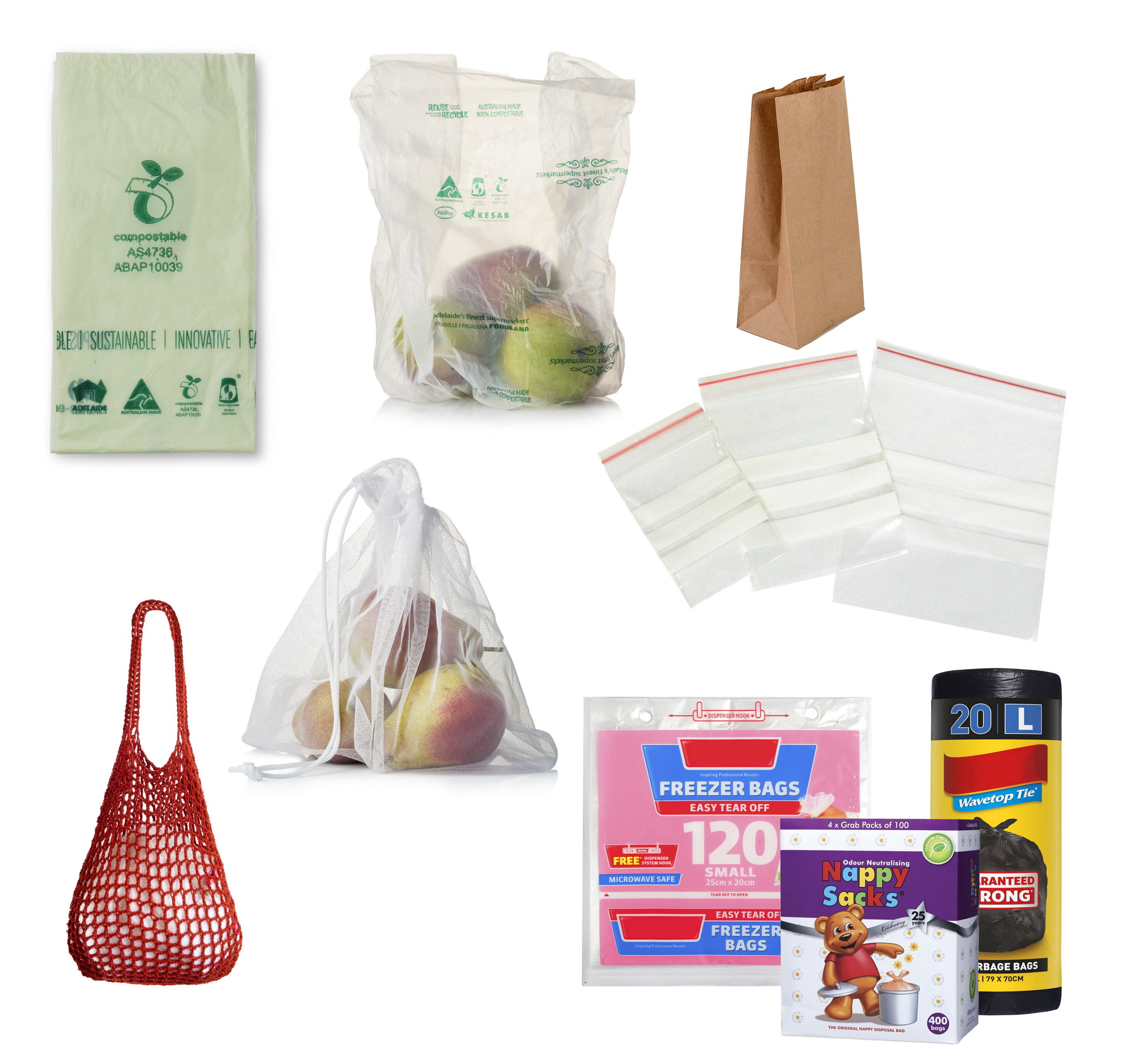
For more information, see the Guide to the ban on plastic shopping bags, plastic barrier bags and plastic bread tags.
Thick plastic/boutique plastic shopping bags
Recent research found that 98% of South Australian survey respondents already own reusable shopping bags, and 25% of respondents do not use plastic shopping bags at all. While the representative survey found that 60% of respondents will sometimes or rarely use a heavyweight plastic bag, only 27% of respondents indicated a preference for these bags. Heavyweight plastic bags are more commonly accepted or purchased in retail settings (80%) compared to grocery shopping (70%) or takeaway food shopping (67%).
In the time since this research was conducted in 2023, the 3 major Australian supermarket chains have moved to offering paper bags for customers, instead of heavyweight plastic bags, as well as a large variety of sturdy reusable bags made from a range of materials. National retailers have also moved to offering non-plastic shopping bags in response to bans on plastic bags in Western Australia in 2022 and an upcoming ban in the ACT commencing 1 January 2024.
What will be banned?
- Heavyweight film plastic shopping bags (>35 microns)
- Plastic-laminated paper shopping bags or plastic-laminated cardboard shopping bags
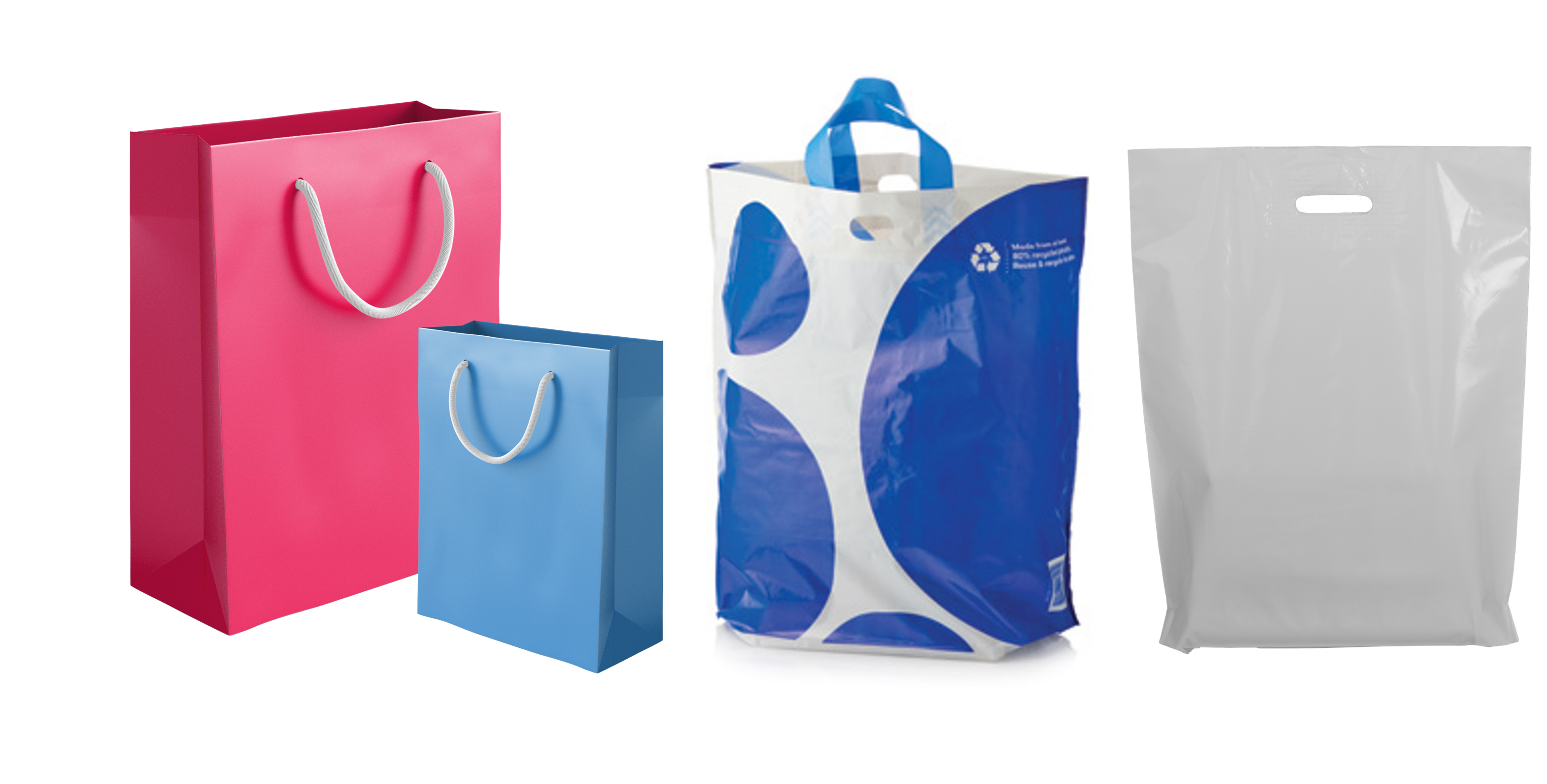
What won’t be banned?
- Plastic bags which are an integral part of the packaging in which goods are sealed for sale (such as pre-packed bread, pre-packed fruit and vegetables, pre-packed hot roast chickens and pre-packed grapes)
- Shopping bags made wholly from non-plastic materials (such as paper, calico, hemp, canvas and jute)
- Multipacks of plastic bags sold on-shelf (such as freezer bags, storage bags, bin liners, garbage bags, nappy bags)
- Bags sold for gift-giving
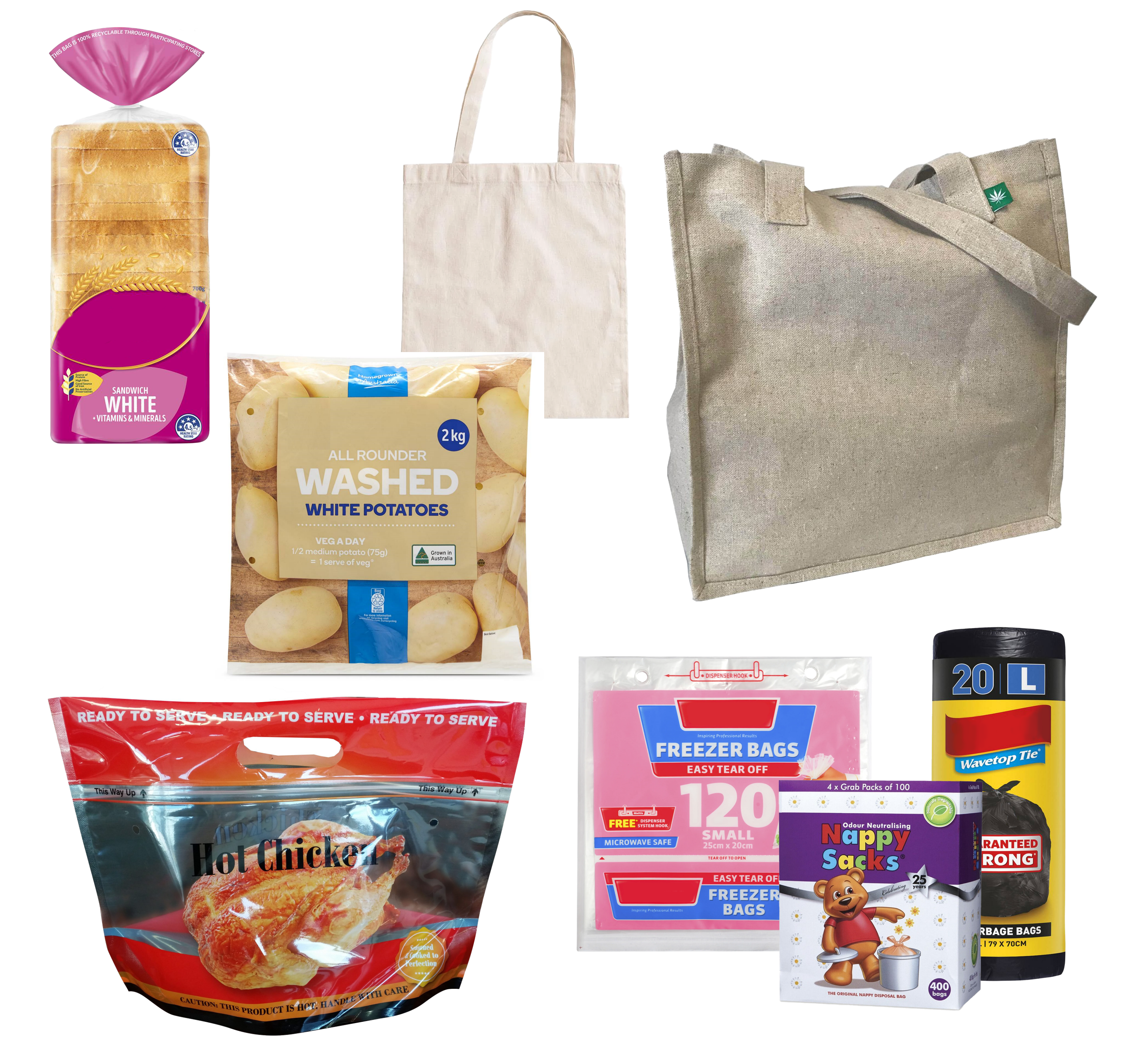
Proposed exemptions
- AS certified compostable shopping bags
- In line with current plastic bag bans in Western Australia, and bans proposed to commence in the ACT from 1 January 2024, reusable bags made, in whole or in part, of one or more of the following fabrics will be permitted:
- nylon
- polyester
- woven polypropylene
- non-woven polypropylene, if:
- the bag has sewn, rather than heat-welded, seams
- the fabric has a minimum weight of 90g/m² measured as a single layer of fabric.
For more information, see the Guide to the ban on plastic shopping bags, plastic barrier bags and plastic bread tags.
Plastic bread tags
What will be banned?
- Single-use or limited use tags, designed or intended to hold plastic bread or other food product bags closed, including (but not limited to) bread bags, produce (fruit and vegetable) bags and rice cakes
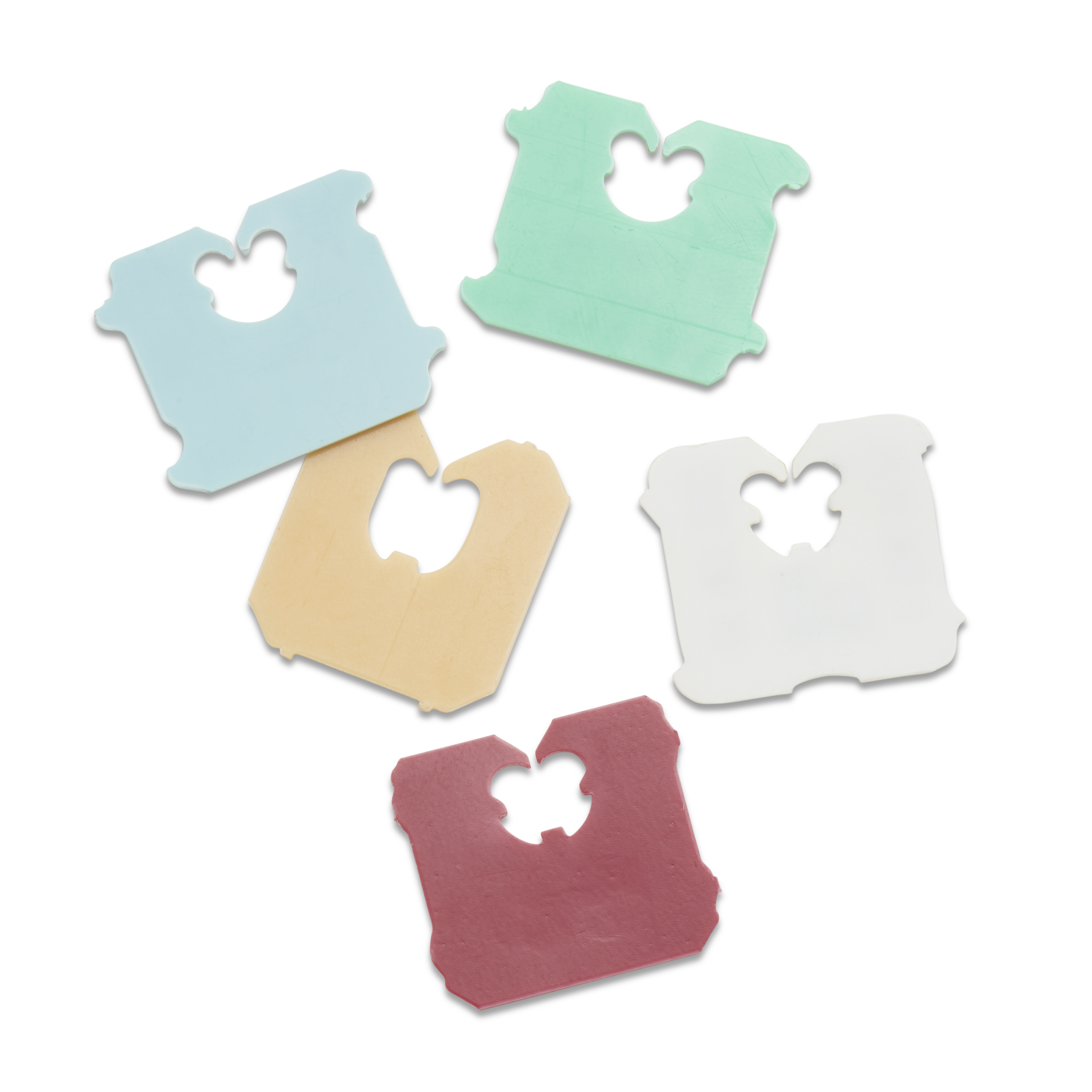
What won’t be banned?
- Similar devices attached to a label for fresh produce where it is not used to close a bag
- Cardboard single-use or limited use devices used to hold plastic bags closed
- Reusable plastic devices and clips that can be used many times to re-seal different bags after they have been opened
- Plastic tape, plastic cable ties and plastic twist tie
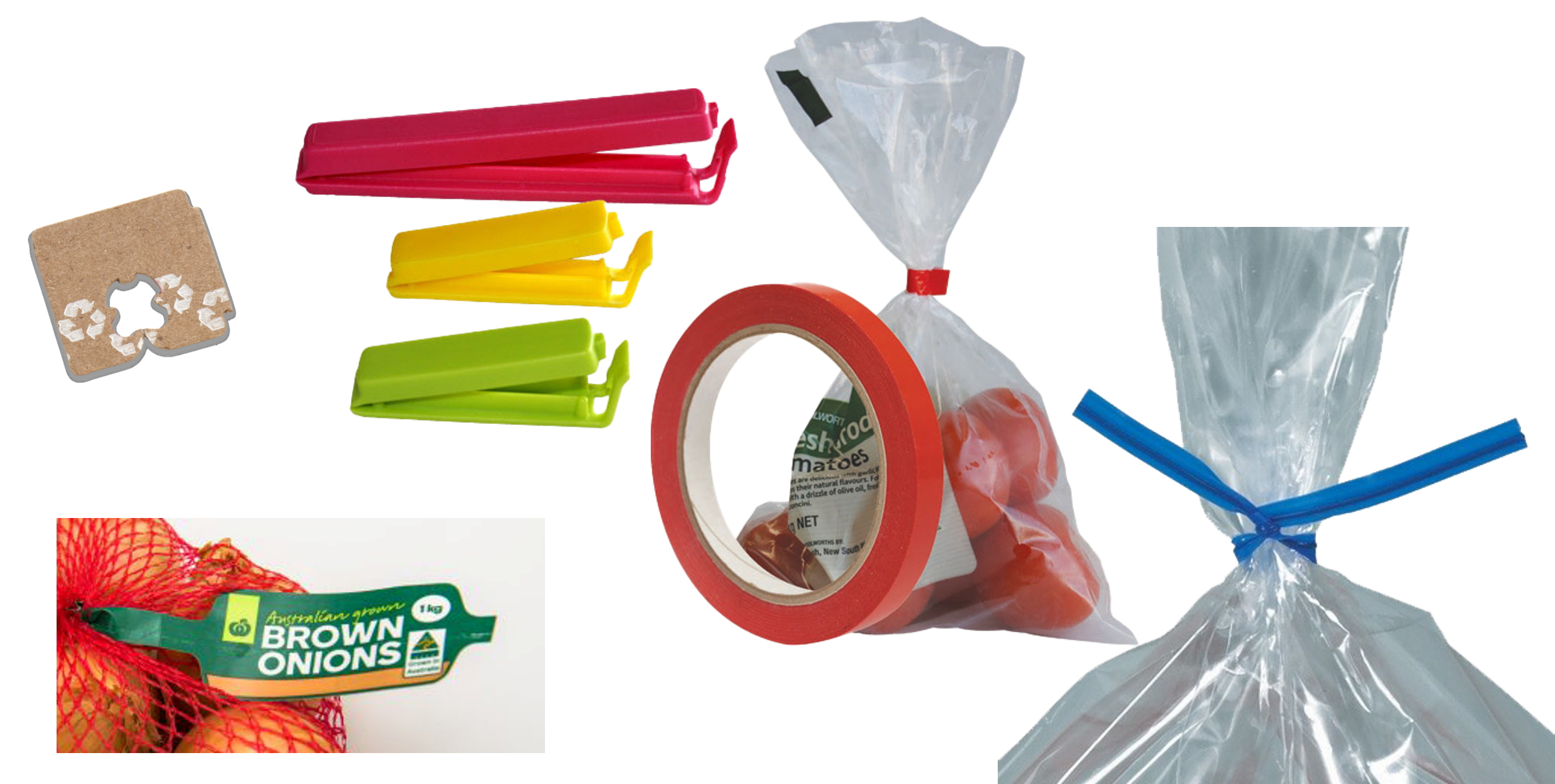
For more information, see the Guide to the ban on plastic shopping bags, plastic barrier bags and plastic bread tags.
Plastic confetti, plastic balloon sticks and plastic balloon ties
Confetti
What will be banned?
- Pieces of plastic designed to be thrown by hand or projected into the air using a cannon or other device, including plastic streamers
- Pieces of plastic designed to be scattered on tables or other surfaces as decorations
- Pieces of plastic enclosed in a balloon (helium or otherwise) either as a decoration or as a material which could be released from the balloon for dramatic effect (for example, a balloon popped to release coloured plastic confetti).
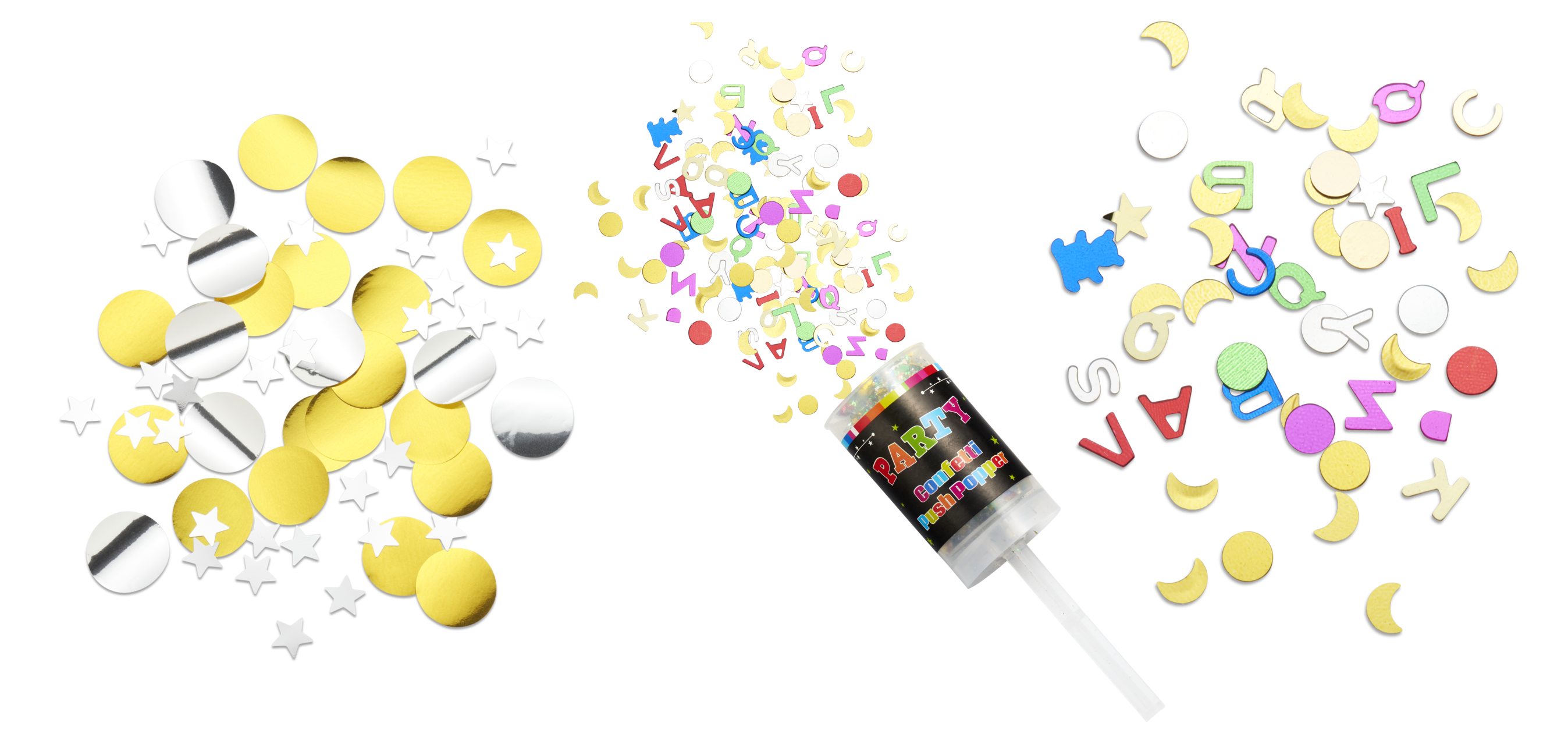
What won’t be banned?
- Sequins, diamantes, beads and other plastic decorations designed and intended to be sewn or otherwise attached to a piece of fabric or garment
- Confetti enclosed in a non-single-use item, such as confetti inside a pen, or as a decoration inside a clear pencil case or snow globe
- Small plastic party poppers containing paper streamers
- Glitter – tiny pieces of plastic, generally bright colours and/or shiny, used as decoration on cards or enclosed in reusable products, such as pens, backpacks and pencil cases
- Small pieces of plastic attached to another object using a form of adhesive or enclosed in a product where it cannot be littered
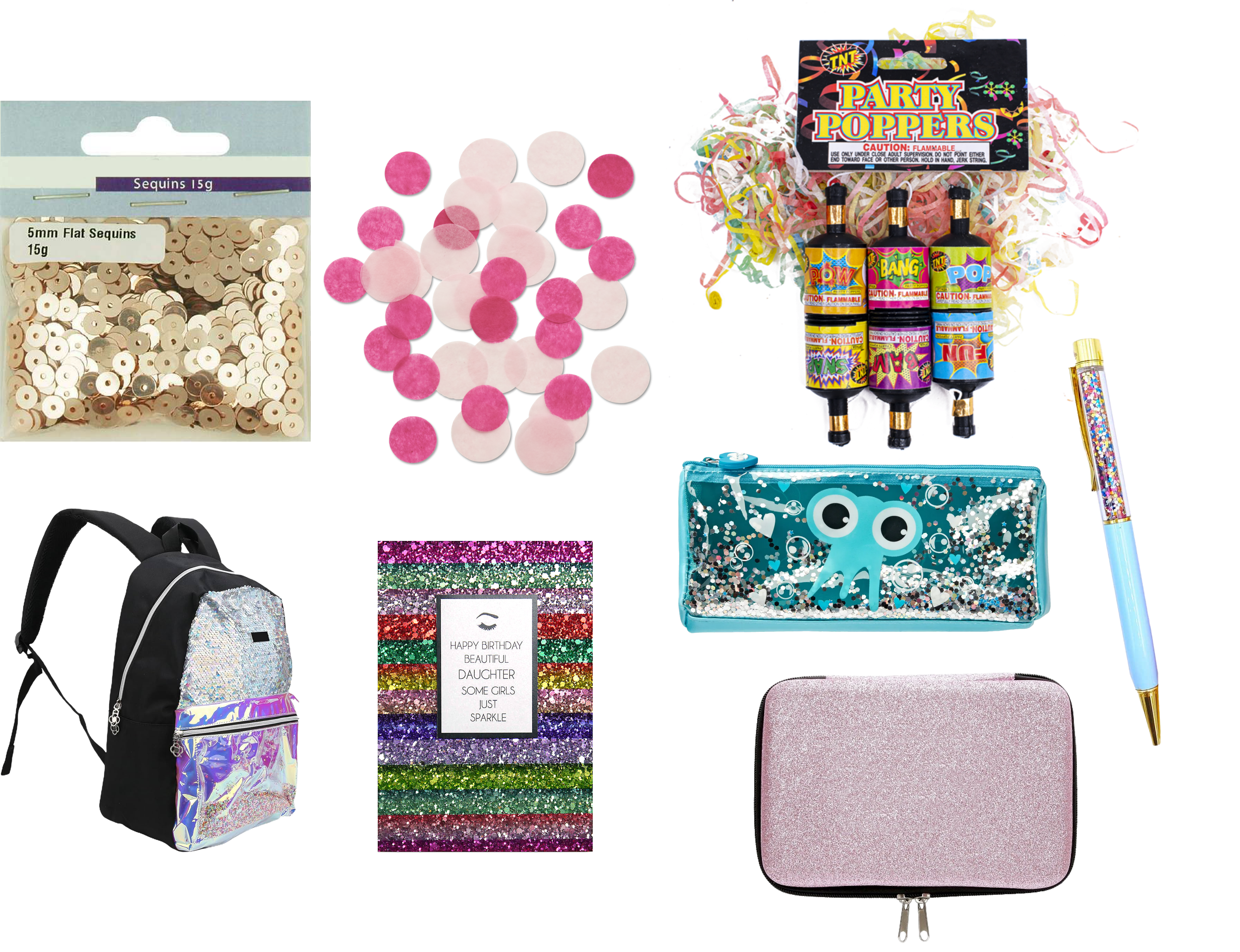
For more information, see the Guide to the ban on plastic confetti, plastic balloon sticks and plastic balloon ties.
Balloon sticks and ties
What will be banned?
- Plastic ties that can be attached to a balloon stick or built into a balloon stick
- Plastic ties used to clip a ribbon to a balloon
- Plastic balloon cups, plastic balloon clips, plastic balloon ‘H’ clips and plastic flower balloon clips
- Plastic balloon clips/ties sold in a pack with other balloon accessories (with balloons, strings, balloon stand, balloon stick)
- Plastic balloon sticks, which are typically about 50cm long and used to carry or display balloons
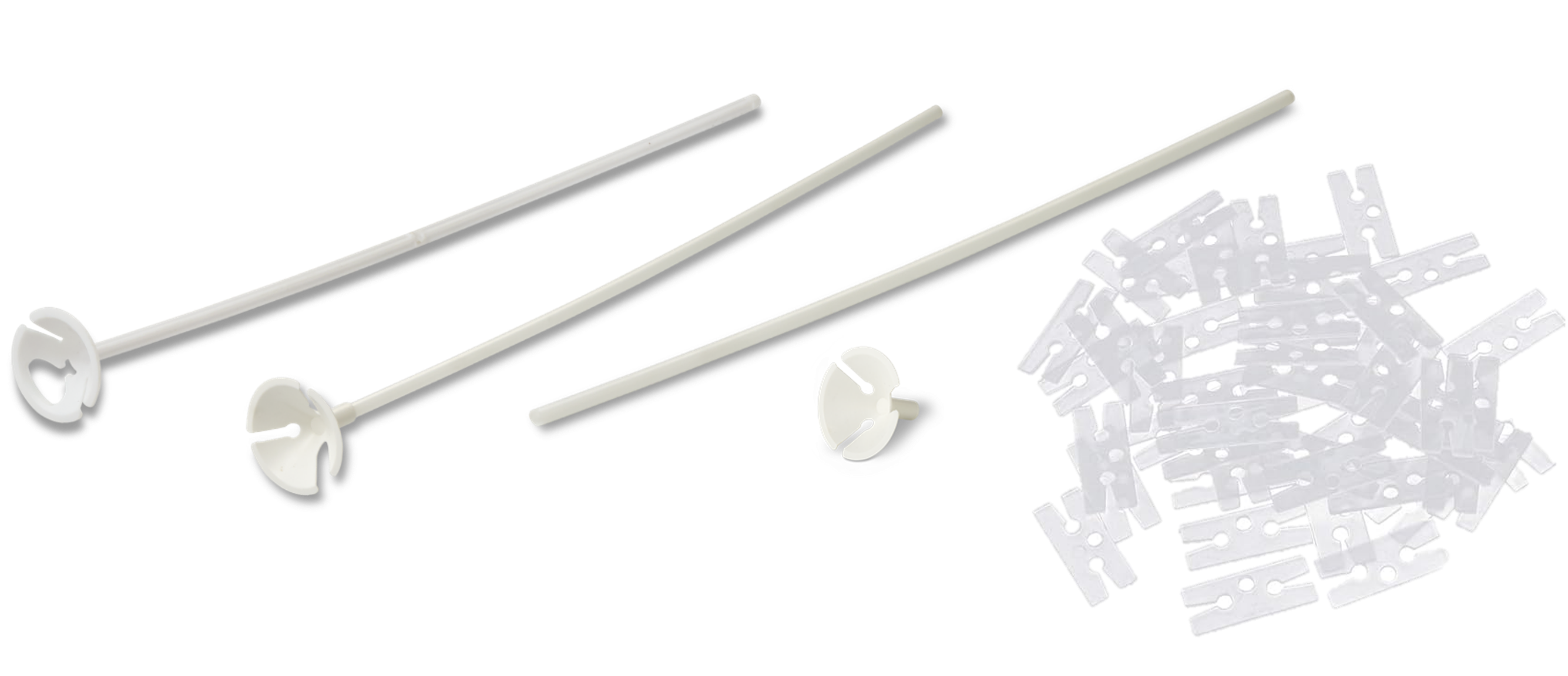
What won’t be banned?
- Ribbons used to tie directly to balloons
- Aids to assist people in tying a knot in a balloon
- Garland tape for multiple balloon decorations
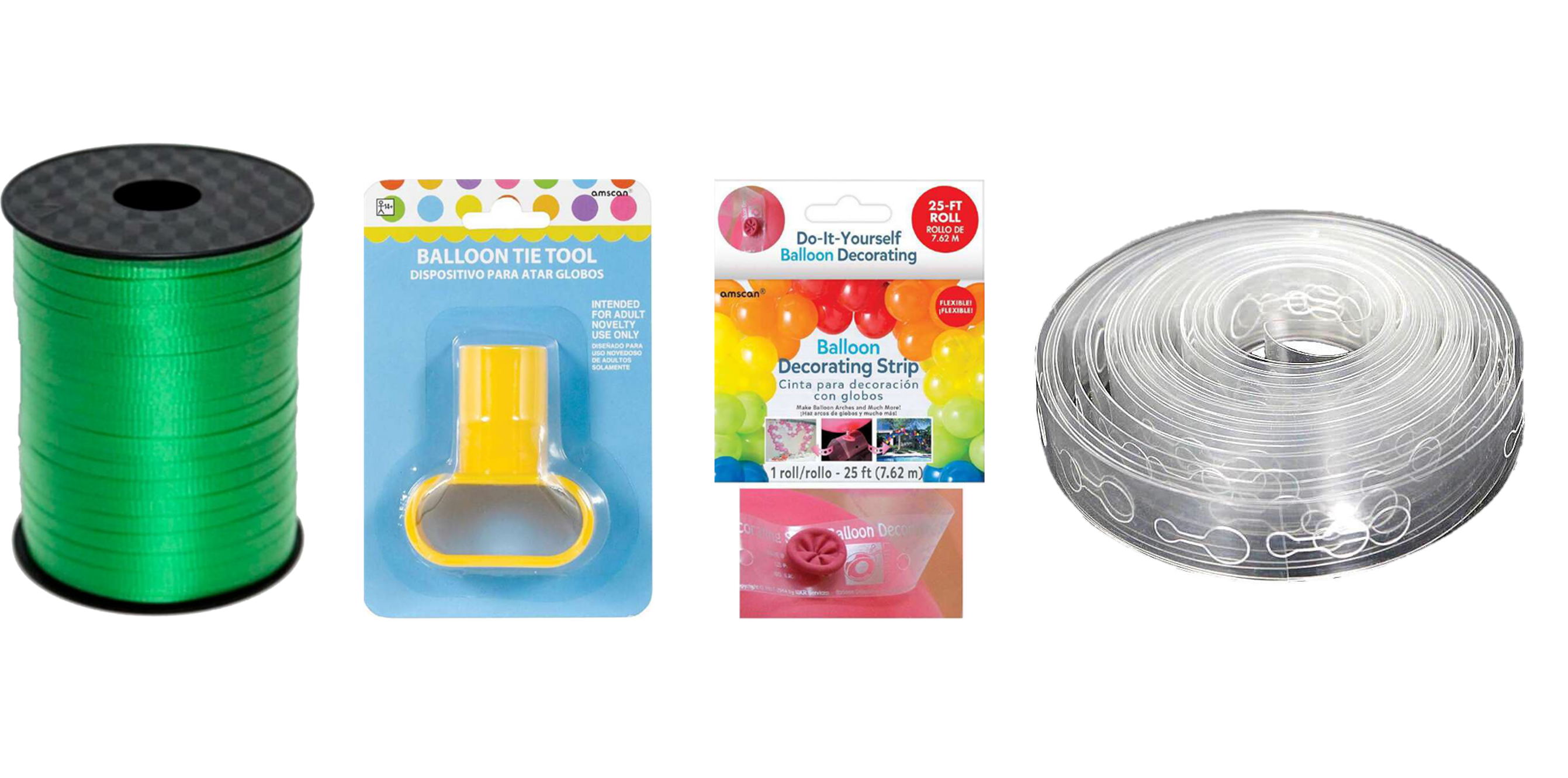
For more information, see the Guide to the ban on plastic confetti, plastic balloon sticks and plastic balloon ties.
2025 bans
Plastic produce stickers
What will be banned?
- Plastic produce stickers that are not AS certified compostable (such as conventional plastic stickers on produce such as apples, pears, avocados, bananas, citrus fruits, and pineapples)
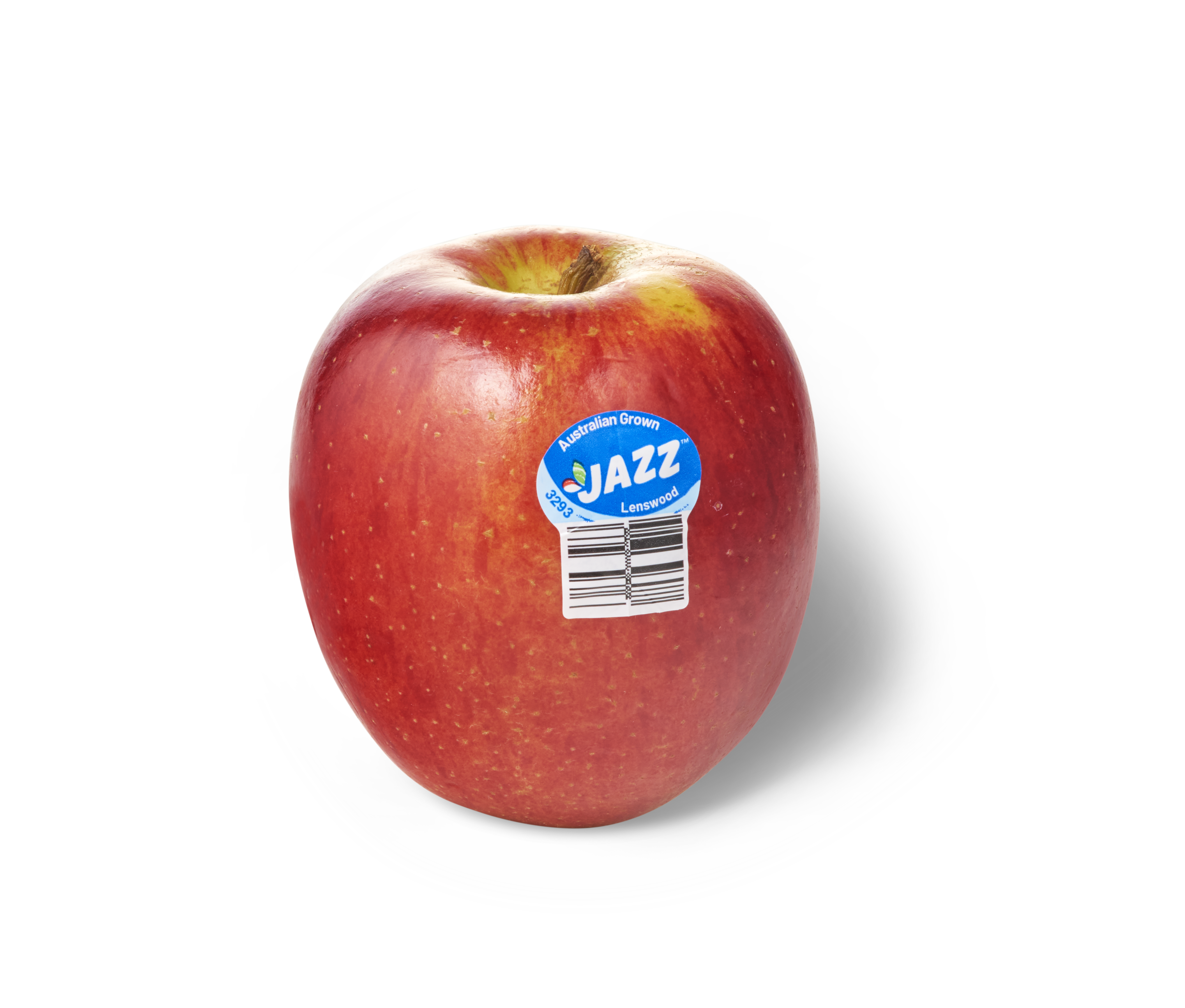
What won’t be banned?
- AS certified compostable plastic produce stickers
- Paper produce stickers
- Labelling produce using laser or similar technology
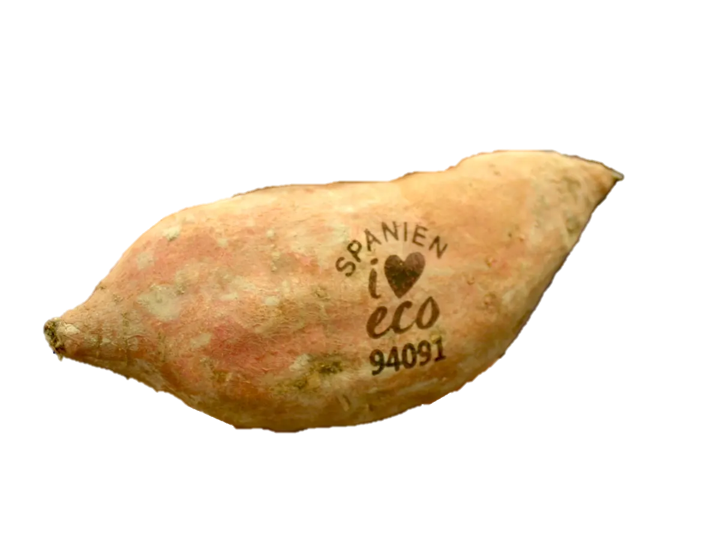
For more information, see the Guide to the 2025 ban on single-use plastics.
Plastic soy sauce fish containers
Small/single serve soy sauce containers are most commonly found in the shape of fish, but can also be pigs, small rectangular receptacles, and even miniature plastic bottles. It is intended that the ban will cover all shapes of single-use rigid plastic containers, with lids, under 30 mL that are used for soy sauce and provided with takeaway foods (such as sushi).
What will be banned?
- Plastic soy sauce fish and other shaped containers with a lid
- Plastic soy sauce containers with a lid, containing less than 30mL of soy sauce
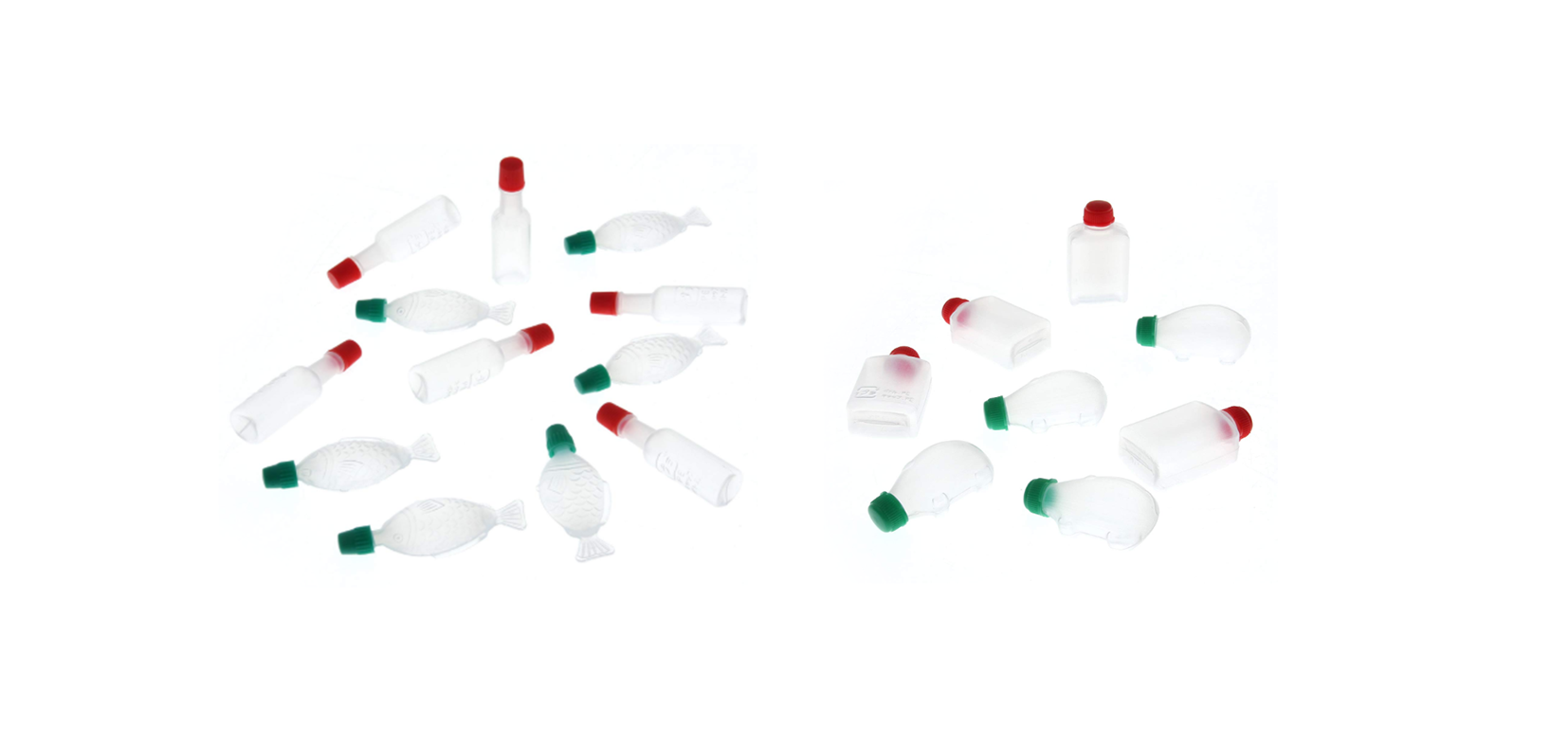
What won’t be banned?
- Sachets of soy sauce and all other condiments of any size
- Squeezy packs of soy sauce and all other condiments of any size
- Pre-packaged off-premise containers of all other condiments
Small cup-shaped plastic sauce containers (with or without lids) that are filled on-premise (that is, not pre-packaged offsite) will already have been banned from 1 September 2024 (see the guideline on food and beverage containers).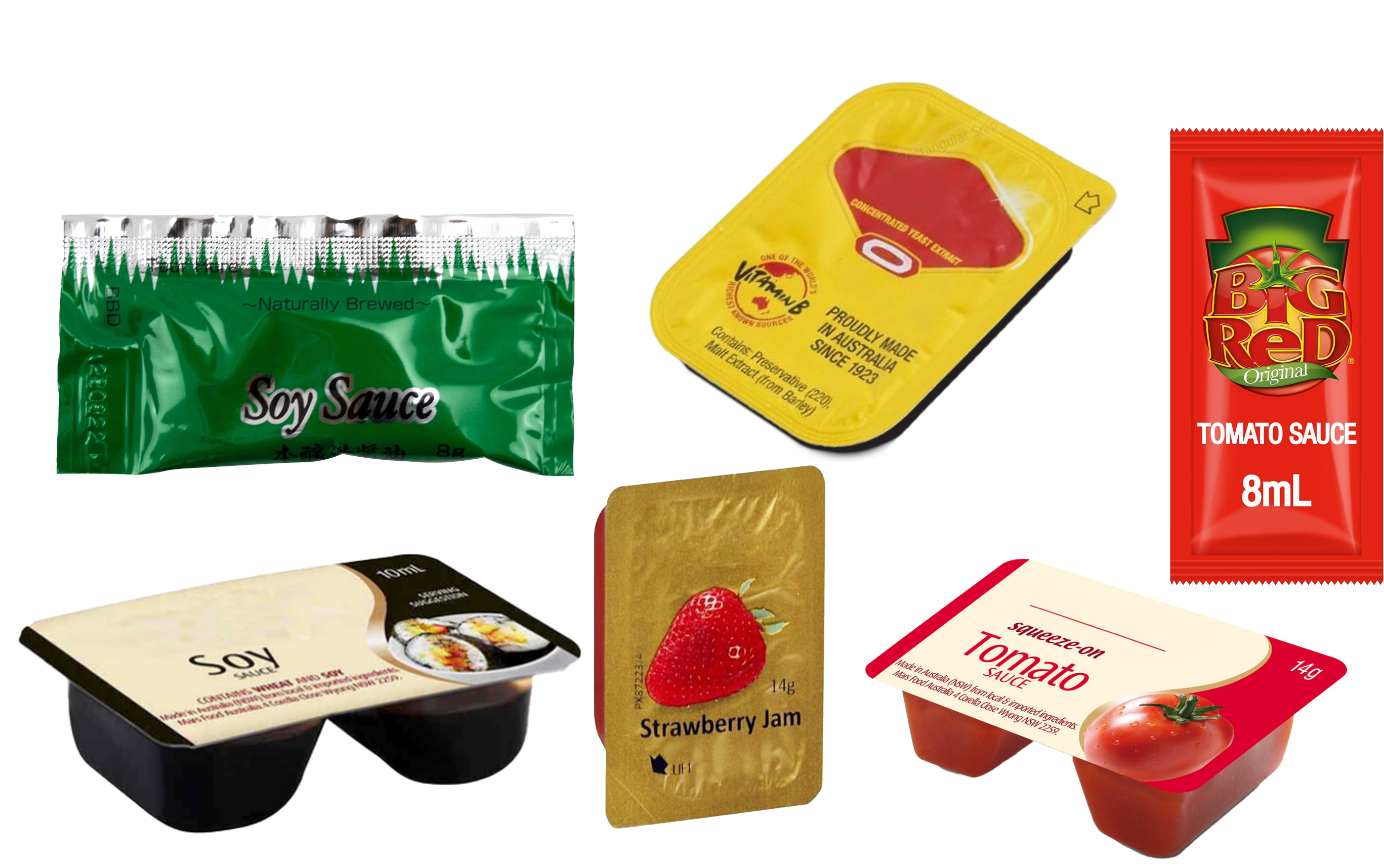
For more information, see the Guide to the 2025 ban on single-use plastics.
Single-use plastic drinking straws and single-use plastic cutlery attached to a food or beverage product
There is an exclusion for single-use plastic drinking straws and single-use plastic cutlery attached to a food or beverage product to enable or assist with consumption of the food or beverage. This will be removed from 1 September 2025.
Removal of this exemption is in line will similar bans being put into place by New South Wales (from 1 January 2025) and by Victoria (from 1 January 2026).
What will be banned?
- Plastic spoons or plastic forks attached to a food container
- Plastic drinking straws attached to a drink container, for example juice drink containers
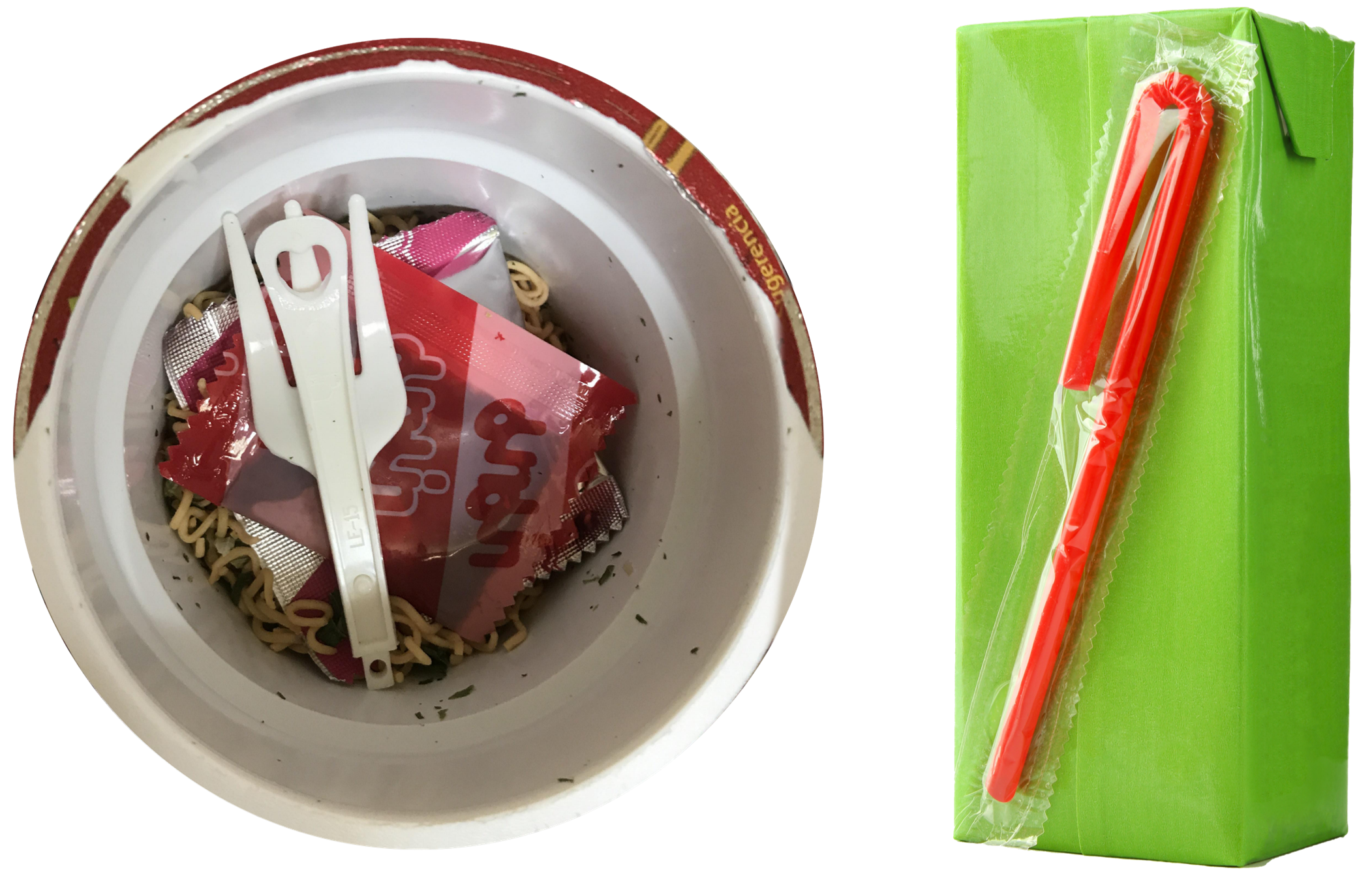
What won’t be banned?
| 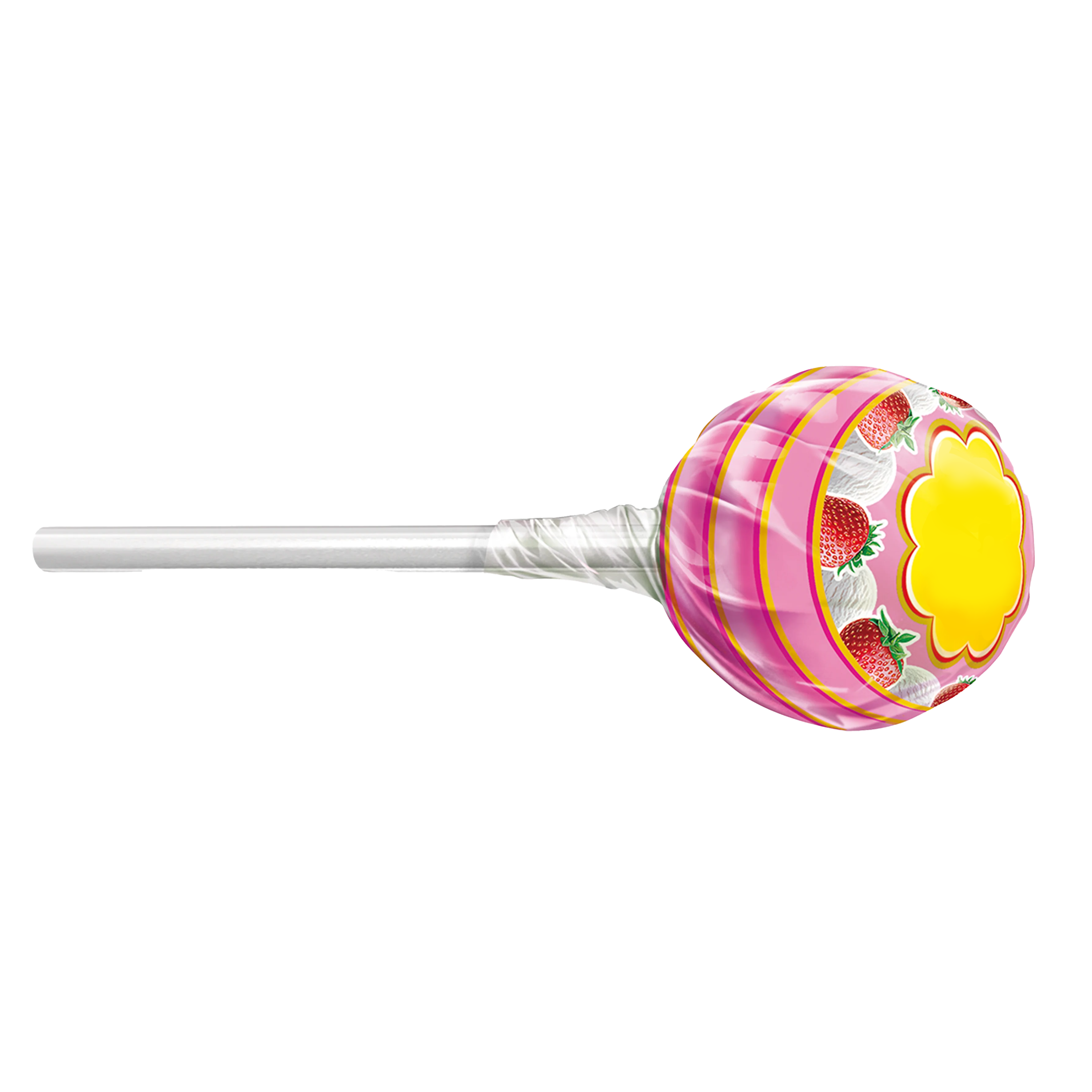 |
For more information, see the Guide to the 2025 ban on single-use plastics.
EPS cups and EPS bowls that form part of food or beverage packaging
From 1 September 2025, the exclusion in place for pre-packaged EPS cups and EPS bowls will be removed. This includes EPS that forms an integral part of the packaging of pre-packaged single serve food or beverage products that are either ready for immediate consumption or consumption after cooling or heating of the contents.
This is in line with similar bans being put into place by New South Wales (from 1 January 2025) and by Victoria (from 1 January 2026).
What will be banned?
- Pre-packaged EPS cups or bowls containing noodles with flavouring
- Pre-packaged EPS cups or bowls containing a meal
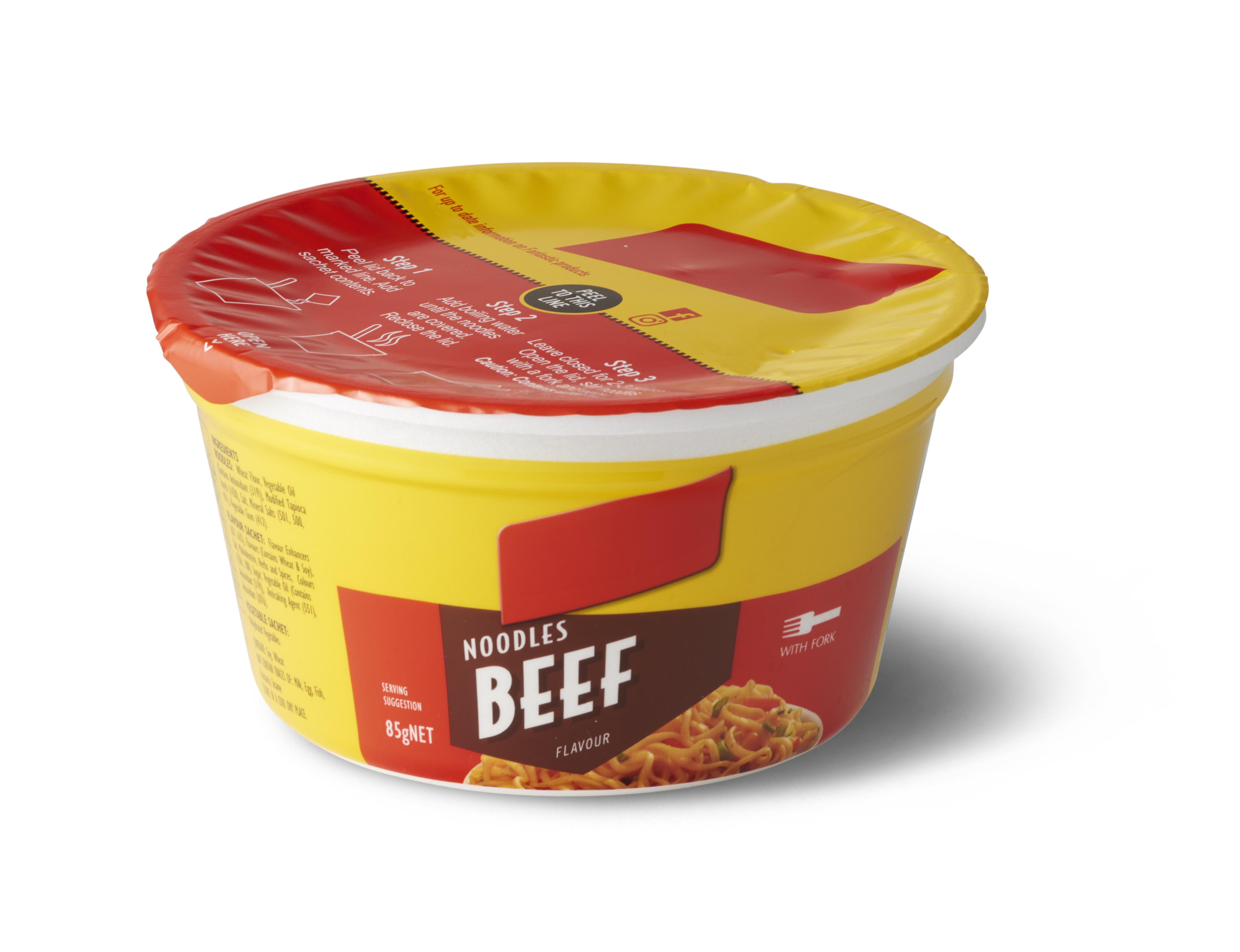
What won’t be banned?
- Plastic packaging that is heat resistant and is not comprised of EPS used for pre-packaged instant noodles, instant pasta, and so on
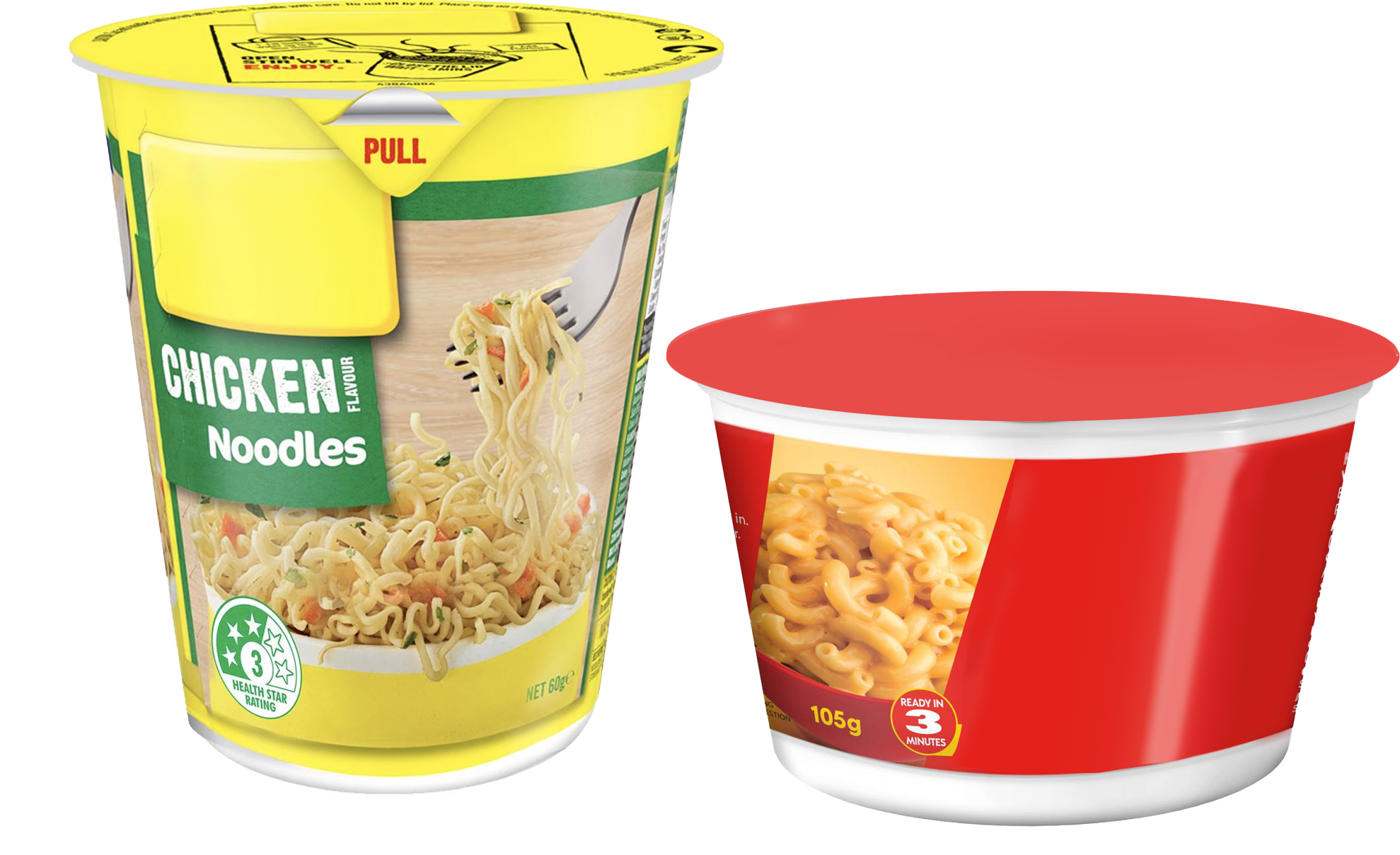
For more information, see the Guide to the 2025 ban on single-use plastics.


